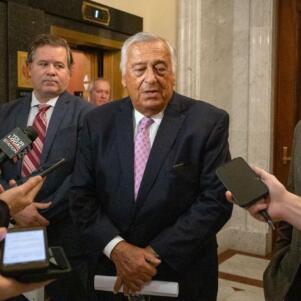Massachusetts Legislature Passes $46.2 Billion Budget With ‘Infanticide’ Abortion Amendment; All Eyes on Governor
By Tom Joyce | December 4, 2020, 17:16 EST

Massachusetts Republican Governor Charlie Baker will have a decision on abortion when it comes to the fiscal year 2021 budget.
Will he accept a version of the ROE Act in the budget bill (Amendment 759) or will he veto it?
The Massachusetts Legislature has approved a $46.2 billion budget — a 5 percent spending increase when compared to last fiscal year despite the state collecting $2 billion in less tax revenue due to the coronavirus pandemic, as State House News Service points out.
To make up for the lost revenue, the state plans to use federal coronavirus relief funding, money from the state’s $3.5 billion rainy day fund, and it plans to expedite the remittance of sales taxes from businesses to the Commonwealth. The latter change could generate $267 million for the state.
Although not a matter of dollars and cents, the version of the ROE Act in the budget amendment would expand the definition of legal abortion in the Bay State after 24 weeks to include cases where “an abortion is warranted because of a lethal fetal anomaly incompatible with sustained life outside the uterus.” Current law allows for abortion after 24 weeks “to preserve the patient’s physical or mental health.”
Additionally, the amendment would lower the age of girls needing parental or judicial consent for an abortion from 17 and younger to 15 and younger. It would also eliminate language from existing Massachusetts law that requires doctors to attempt to save the life of a baby born alive after an attempted abortion.
Supporters say the abortion amendment is needed because the recent elevation of Justice Amy Coney Barrett to the U.S. Supreme Court means the court may have a majority willing to overturn Roe v. Wade, the 1973 U.S. Supreme Court that legalized abortion nationwide. They also say that women should have the ability to have a late-term abortion in Massachusetts if their fetus is diagnosed with a fatal condition, and that girls ages 16 and 17 should not have to go to a parent or a judge to get an abortion.
Opponents say that legal abortion is in no danger in Massachusetts, because a 1981 Massachusetts Supreme Judicial Court decision found that abortion is a fundamental right under the state constitution, and since a large majority of state legislators and high-court judges in Massachusetts support legal abortion.
They also argue that minors ought to have to consult with a parent or a judge before pursuing an abortion, and that the abortion amendment would legalize infanticide, since it seeks to remove a provision in existing state law that requires a doctor to try to save the life of a baby who survives an attempted abortion.
In early November, Massachusetts House Speaker Robert DeLeo (D-Winthrop) and Senate President Karen Spilka (D-Ashland) put out a joint statement in response to Barrett’s confirmation, announcing their support for passing a version of the ROE Act bill before the year ends.
“We are very concerned that Massachusetts’ women’s reproductive rights are under threat at the national level,” DeLeo and Spilka said. “We are therefore committed to debate measures in the House and Senate this session that would remove barriers to women’s reproductive health options and protect the concepts enshrined in Roe v. Wade.”
Abortion expansion is not the only non-monetary item in the budget. It also would expand mail-in voting for all state and municipal elections through March 31.
The budget also includes coronavirus recession relief, drastically increasing spending in various areas.
That includes a $33 million increase to the Rental Assistance for Families in Transition program, increasing its value to $50 million. The bill would increase funding for emergency food assistance by $10 million from $20 million to $30 million, and would double the Health Incentives food program to $13 million.
It also would create new spending programs. These include $30 million to subsidize child care, $25 million for early education providers to purchase supplies for the coronavirus pandemic and give their staffs incentive pay, as well as $15 million for a Community Empowerment and Reinvestment grant program. The grant program is for communities that have purportedly been harmed by the criminal justice system.
Fiscal year 2021 began on July 1, 2020, and the Commonwealth of Massachusetts has been running on an interim budget since then. Baker signed a $16.53 billion interim budget in August. The idea was that it would have enough funding to run the state through the end of November, but it actually includes enough funding to keep the state afloat “several days” into December, as State House News Service reports.
The House and Senate approve the budget Friday afternoon. Governor Baker now has 10 days to sign or veto it. He has a line-item veto, which means he could veto the abortion amendment irrespective of what he does with the rest of the budget bill.
If he does, it would set up a possibly dramatic vote in the House, where opponents need to flip a net of four pro-ROE Act votes to sustain a veto.











